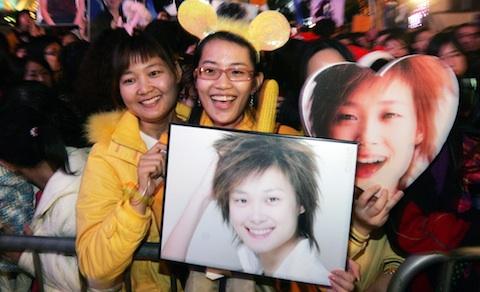
Fans of Chinese singer Li Yu-chun, Super Girl's Voice 2005 winner, show their support during an event in Hong Kong, Dec. 24, 2005, file photo. (AP)
One of the most popular TV programs in China has been cancelled, again. The removal of Super Girl (快乐女声) from the airwaves has caused a stir on Chinese microbloging sites.
The show was an American Idol type TV program started in China in 2004 by state TV in southern Hunan province.
After a three year suspension, it was re-launched in 2009 as “Happy Girl” in Chinese (even though it was still called Super Girl in English). But last month (September, 2011), the State Administration of Radio, Film, and Television (SARFT) ordered the show to stop broadcasting.
The reasons for the cancellation are varied, depending on who you ask. The official reason is the show was too long. But many commenters are pointing to the show’s use of an audience text voting system for the contestants and what some Chinese officials have called the “vulgar” use of young women singing pop songs.
A clip from the final broadcast:
| A sample of the online reaction to the show’s cancellation.
Sina weibo user Dajiabai longmenzhen said: “The reasoning of the management behind the stopping “Happy Girl” include: 1. You must listen to us, and comply with our regulations (whether it’s reasonable or not), otherwise the consequences will be severe; 2. Whatever you do, make sure your program isn’t the best, just average, otherwise others will be unhappy, affecting social stability and harmony.” 快女停播背 后隐含的管理思路包括:1.一定要听我的,服从管理规定(不管是否合理),否则后果很严重;2.千万不要做到最好,做得一般优秀就成了,否则别人会不舒 服,影响社会稳定和谐; Baidu’s Super Girl postbar user qq920966254 said: “Stupid idiots, stop broadcasting Super Girl for one year, why not get the person who ordered it to stop broadcasting to go plow fields for a year! If we don’t have “Happy Girl” and “Happy Boy” I’d be bored to death during the summer. It has seriously overrun its time slot, but you can broadcast the show earlier!” 麻痹的,停播一年,那不如叫那个停播的人去耕田耕一年去吧!没了快男快女生活夏天无聊死了,虽然说是严重超时,但是可以提早播放啊!鄙视停播的人,以为自己官大就可以无视我们这些青少年,如果觉得我说的对就顶我吧! Sina weibo user Xiaoxiaolu said: “Happy Girl” is going to stop broadcasting. I’ve seen many netizens’ comments saying that it should have stopped a long time ago; if this kind of contest can be broadcasted, then Adult Videos should be broadcasted as well. What is a reality show competition? It’s just a shortcut to realizing the vanity of people who are greedy and lazy: crappy programs are teaching the audience the wrong lessions.” 快女停播咯,看到很多网友的评论是早就该停了;这种选秀能播,av也能播了;选秀是啥?就是好吃懒做的人实现虚荣心满足的捷径;烂节目把观众都教坏了 Sina weibo user Limited Edition – Zhan said: “Happy Girl will stop broadcasting, yeah!” 快女停播,好野! |
Xinhua, China’s state news network, reports a show that “promotes moral ethics, public safety and provide practical information for housework” would be replacing Super Girl.
Meng Jing, a popular entertainment reporter associated with Sanlian Life Weekly (三联生活周刊), a current affairs and culture magazine, spoke to me online about the program being censored by SARFT. “Super Girl was the straw that broke the camel’s back in terms of Hunan TV’s entertainment programming. But Hunan TV had their own problems as well,” she said.
I talked with Adele Huang, an editor at Hunan TV, about the quality of the show. When asked if the show had gotten weaker since 2005, she said “It really did get worse. It’s hard to talk about the two periods in the same breath.”
In conservative circles, Super Girl contestants were still viewed as source of moral corruption for youth. The lives and deeds of Super Girl contestants have been chronicled by Chinese netizens, who are not always supportive.
In one example, bikini photos of 2005 contestant Chen Yi (陈怡) were spread online after she tried to break into the entertainment industry in Japan.
The most popular winner of all time, Li Yuchun (李宇春) started an androgynous, or sexually neutral, haircut fad for girls and became a lesbian sex symbol. This was another aspect of the show’s supposedly “corrupting” influence.
Similarly, plastic surgery scandals meant that SARFT was eager for Hunan TV to give themselves their own facelift.
Wang Bei (王贝) was a contestant on Super Girl in 2004. News emerged in 2011 that she died while undergoing cosmetic surgery to help her enter the entertainment industry. Her death shocked the nation and renewed not just the debate on cosmetic surgery, but also on the nature of Super Girls.
Controversy has plagued other popular Chinese TV programs like Jiangsu TV’s dating show If You Are The One (非诚勿扰) where the appearance of a model named Ma Nuo sparked an online as well as real campaign against “money worshipping girls.”
Meng Jing blames Hunan TV and the industry around Super Girl. “They can’t digest all the people who are involved in it. It’s an awkward competition. Afterward, the contestants have very hard lives. In 2007, our magazine concluded that only five contestants ended up having commercial value in the long run,” she said.
She pointed to Yi Hui (易慧), who was booked for commercial appearances after she came in eighth in 2005. Meng Jing said the young woman went from earning 50,000 yuan per performance to less than 500 yuan per show.
Many younger Chinese TV viewers now prefer to watch Qinghai TV’s Blossoming Flowers (花儿朵朵), and Liaoning TV’s Chinese X Factor (激情唱响), which are both new programs.
Meng Jing told me “The life cycle of a singing show with contestants in China is only five years at most.” It’s no surprise that people are willing to switch over their allegiances so quickly. With the show making a loss in both advertising and audience numbers, and with a top to bottom official system that wanted to “cleanse” its entertainment programs, there was nowhere to go but to close up shop.

One response to “A Controversial End for Super Girl in China”
I hope you continue to blogging because you are good.